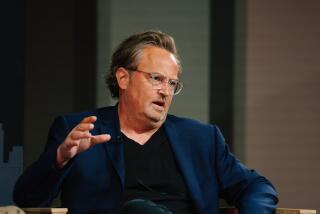Jury Convicts Colton Physician of Cancer Fraud
- Share via
A Colton physician who sold cancer victims ADS--a substance consisting of 99.4% water with the remainder a brownish sludge made up primarily of coliform bacteria--was convicted Thursday of 24 counts of cancer fraud and grand theft.
Dr. Bruce Halstead, 65, who sold the murky potion for $125 to $150 a liter, faces up to eight years in prison when he is sentenced Oct. 31 by Los Angeles Superior Court Judge Marvin D. Rowen.
The physician, who said he will appeal the conviction and file a federal lawsuit against the district attorney’s office, was led off to jail after the reading of the verdict. Rowen set bail at $100,000.
Deputy Dist. Atty. Hyatt Seligman termed the verdict by the jury, which deliberated five weeks, conclusive proof that Halstead, who has described himself as an eclectic, holistic, alternative physician, is nothing more than “a crook selling swamp water.”
‘Selling Swamp Water’
“The verdict shows we were dealing with a doctor selling swamp water to desperately ill cancer patients,” said Seligman, who prosecuted the case. “It’s the worst form of exploitation possible.”
Halstead, a 1948 medical school graduate well known as a champion of laetrile and other unconventional cancer therapies, was charged with 26 counts stemming from the sale of ADS to 10 victims of cancer and other serious diseases. Three of those victims have since died.
Serving as his own attorney, Halstead testified during his five-month trial that he did not know the exact contents of ADS, which was marketed as a Japanese herbal tea, and that it had been sold to him wholesale by a man he thought was a fraud.
But the doctor swore that he nonetheless believes in the substance and that he never promised it would cure cancer. Rather, he said, ADS is a nutritional supplement he supplied to patients in an attempt to benefit their health.
“I am (not) so stupid to believe I am curing cancer,” Halstead said during his closing arguments. “What I am trying to do is to provide support for the body . . . . There are no laws governing nutrients.”
Halstead said the case involved the rights of ill patients to seek any treatment they prefer, particularly when costly, painful, traditional medical efforts to treat cancer often prove fruitless.
“I believe when my patient comes in and says, ‘Hey, I’m terminal, can you relieve pain, can you make me feel better, even for a short period of time?’ I feel that I have a moral, a religious, a scientific, a legal obligation to help that patient in any way that I can.”
Seligman countered that even if Halstead did not directly say so, he had implied that he had a cure for cancer.
“Between the lines he was saying we have something here that has had great success,” the prosecutor said. “You’re talking to desperate people and they are going to take whatever chance they can get. Clearly with ADS the purpose was to treat cancer. You can’t tell me . . . that people were paying $150 a liter for ADS because it tasted 150 times better than Lipton tea. That is poppycock. They were taking it to save their lives.”
Charges were filed against Halstead in February, 1984, after an inquiry resulting from a complaint by the Rev. Paul Doepke, a Chatsworth minister who eventually died of leukemia. Doepke, whose widow testified against Halstead, told state officials that he had spent $6,000 on ADS after visiting the Colton-based Halstead Preventative Medical Clinic.
In all, Seligman called more than 40 witnesses, including several victims or their survivors. Halstead called five witnesses, including Melodee Wolf, whose 6-year-old daughter eventually died of cancer.
Wolf said Halstead “did not promise me anything . . . (but) he offered me hope because he was willing to at least help.”
“That poor child,” Seligman said, “died less than five months after she drank that swamp water day after day, $1,500 worth.”
The trial was also spiced by the use of two dissimilar props.
Seligman, for his part, brandished a container of the expensive ADS, which had been seized from Halstead’s institute.
Halstead, meanwhile, waved a more familiar, and cheaper, box of bran flakes during his opening and closing arguments. If ADS is considered a drug, Halstead argued, any type of food, including cereals, also can be considered drugs.
The jury could not reach a verdict on one count of conspiracy and found Halstead not guilty on a single count of cancer fraud concerning an undercover agent sent to the doctor’s clinic by authorities.
Two co-defendants--Alfred M. Dix, 57, a retired broadcast engineer from Marina del Rey, and Robert A. Sanford, 47, a Chatsworth contractor, both of whom sold ADS--previously pleaded guilty and have been sentenced to probation.
Gary Middleton, 36, who sold ADS to Halstead, and Kazuo Yamagishi, 53, the substance’s purported inventor, remain at large. Both are wanted on cancer fraud charges.
More to Read
Sign up for Essential California
The most important California stories and recommendations in your inbox every morning.
You may occasionally receive promotional content from the Los Angeles Times.










